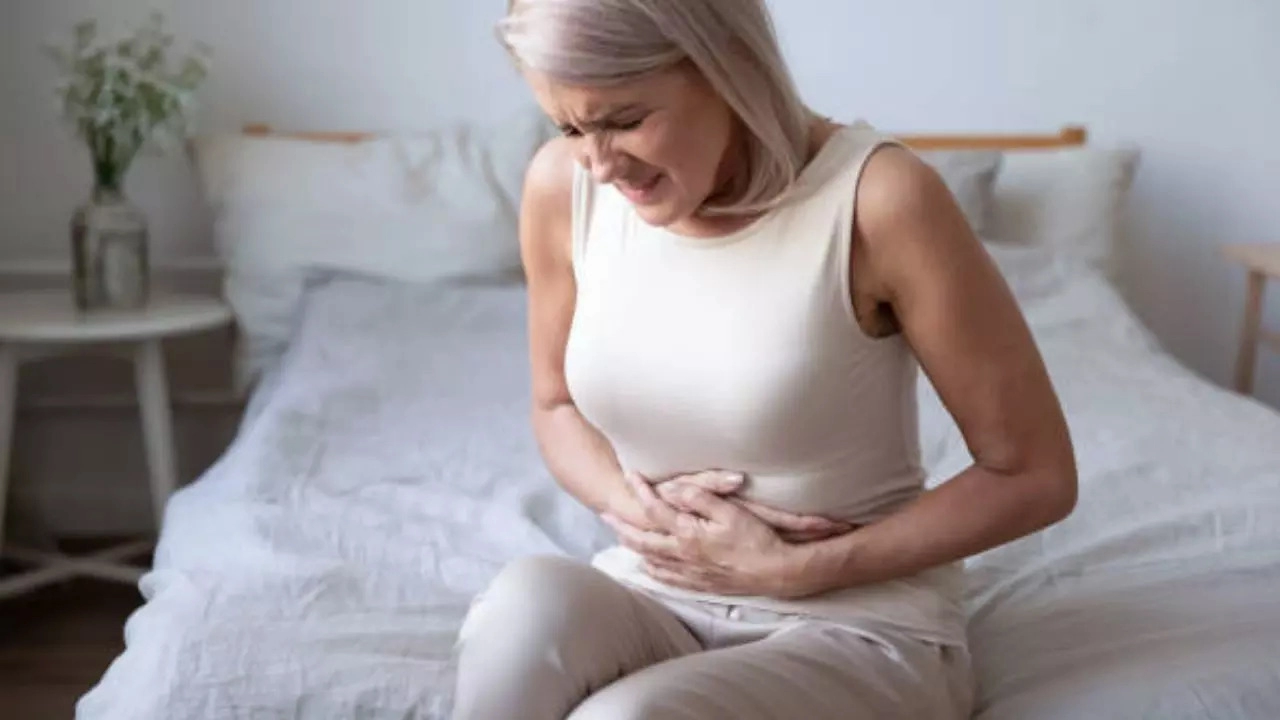
Premature Menopause: How It Affects The Mental And Physical Health Of Women (Image Credits: iStock)
Every woman goes through a phase of menopause where ovaries stop making hormones and periods stop before the usual age. The usual age for menopause is 50. The causes for early menopause could be many including a medical reason, such as when both ovaries are removed in a hysterectomy. Early and premature menopause can have the same causes. The only difference is the age at which it may happen. Menopause that happens before age 45 is called early menopause. Menopause that happens before age 40 is called premature menopause. But what are the symptoms of menopause? How can it affect a woman's mental and physical health? We got in touch with Dr Padmapriya Vivek, Chief Gynaecologist, Obstetrician, and Infertility Specialist at Gleneagles Global Health City, Chennai who shares insights on this.
Common Symptoms Of Menopause That Indian Women Experience
Dr Padmapriya shares that some women do not show any symptoms, while others present with many symptoms, including hot flashes, night sweats, anxiety, irritability, ocular disturbances, joint pains, vaginal dryness, numbness, and tingling.
“Distress in the menopausal period emerges mainly from somatic changes (heavy and painful bleeding, sleepless nights, irritability, anxiety, mood swings, and frequent headaches). Abnormal vaginal bleeding after menopause is a red flag that should be investigated by a doctor,” she said.
Studies have shown that starting menopause after age 55 increases a woman’s risk of breast cancer, endometrial cancer and uterine cancer. Other studies have also pointed out that the risk of breast cancer and ovarian cancer may be increased in some women who experience early menopause. Hence, it is ideal for women to go through periodical health checkups, at that age.
Best Treatment Options For Severe Menopausal Symptoms
Hormone replacement therapy (HRT) is the most common treatment for menopausal symptoms, Dr Padmapriya explains. HRT is most effective for those who have symptoms, though long-term exposure may increase the risk of heart disease and breast cancer. Vaginal oestrogen, available as a cream, ring, or tablet, can relieve vaginal dryness and painful sex.
“Even for cancers in perimenopausal or menopausal women, treatment options are available. One of them is robotic-assisted surgery (RAS). With its precision and minimally invasive approach, advanced robotic technologies like da Vinci allow surgeons to perform complex procedures with smaller incisions, resulting in less blood loss, reduced pain, and faster recovery times. In cases of uterine, ovarian, and endometrial cancers, it facilitates the accurate removal of cancerous tissues and lymph nodes, improving outcomes while minimizing complications. Additionally, this technology allows for better visualisation of hard-to-reach areas, ensuring effective removal of affected tissues, without harming the surrounding healthy tissues. This advanced technique not only enhances surgical precision but also provides patients with quicker recovery, fewer complications, and improved overall quality of life,” she said.
Are More Women Approaching To Address Menopause Than Before?
Menopause and menarche (first-period cycle) are taboos and are rarely discussed in Indian society. But times are changing, and more and more women are seeking medical help to manage their menopause better. Dr Padmapriya shares that even though menopause is a universal condition that women experience, doctors have to treat each woman’s case differently as symptoms of menopause vary widely among women due to differences in how their oestrogen levels decrease.
Descent of the uterus is common and needs repair which can be managed effectively with Robotics. Postmenopausal bleeding without malignancy or borderline malignancy can be operated effectively through Robotic-assisted surgeries.
How Does Early Menopause Or Premature Menopause Affect Indian Women?
Women with early or premature menopause have lower oestrogen levels, which can increase the risk of developing conditions like osteoporosis, cardiovascular disease, and weight gain. Other health issues include cognitive impairment, dementia, parkinsonism, glaucoma, mood disorders, and sexual dysfunction. Early menopause can increase the risks of breast and ovarian cancer.
“As early menopause may hamper a woman’s ability to conceive and give birth to a baby, mental health issues may also happen which may require psychological intervention,” Dr Padmapriya explains.
How Does Menopause Affect Mental Health, Particularly For Indian Women?
“Many Indian women experience the distress of menopause more intensely when compounded by negative life events and a lack of support, often leaving them unable to share their struggles. Those without a strong support system are more likely to suffer in silence, especially due to the societal taboos surrounding menstruation and menopause. However, many women also express relief at the end of menstruation, finding freedom from the physical burden of managing heavy and painful periods, which can be especially challenging at an older age,” she shares. For rural and some urban women, menopause also sets them free from societal restrictions, such as the prohibition against entering sacred places or participating in rituals.
What Role Do Diet And Fitness Play In Managing Symptoms Of Menopause?
According to Dr Padmapriya a healthy lifestyle, including nutritional supplementation, regular exercise, adequate sunlight exposure, and sufficient sleep, is essential for all menopausal women experiencing symptoms. Simple lifestyle changes, such as sleeping in a cool room, using a fan, avoiding smoking, caffeine, and alcohol, and practising deep breathing during hot flashes, can also provide relief. A diet rich in fruits and vegetables further helps manage menopause symptoms.
“Smoking has a significant impact on menopause, with smokers typically experiencing it nearly two years earlier. Menopausal women often face comorbid conditions, such as diabetes, hypothyroidism, chronic migraines, and hypertension, among others,” Dr Padmapriya shares.
How Can Family Members Support Women Going Through Menopause?
Family members can play a supportive role in the life of a woman going through menopause. “They can firstly learn/read more about the condition, ask relevant questions to the woman or her healthcare provider, listen when inputs are being given, help select the best treatment options, lend a kind listening ear and be receptive to her needs. Communication is key, and somebody who is going through menopause will appreciate her family’s efforts to help navigate it,” Dr Padmapriya said.
Get Latest News Live on Times Now along with Breaking News and Top Headlines from Health and around the world.

